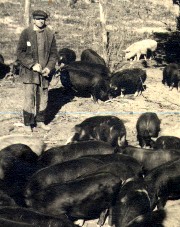|
According to the Agriculture Weekly (Capital
Press, Dec 26/97) 60 percent of rivers and streams impaired with agricultural
runoff is contributed to animal waste. In 1996 forty spills of animal
waste killed 670,000 fish in Iowa, Minnesota, and Missouri. That was
double the number of spills in 1992. A planned 50,000 acre hog farm
in Utah could potentially generate more waste than the city of Los Angeles.
That could not happen if the smaller amount
of animal waste was returned annually to the soil. This is one more
reason for which I mourn the loss of the family farm. Fecal coliform,
E-coli, comes from all animals. Outbreaks of disease from ingestion
of human coliform occurred once in a while from unclean hands of restaurant
workers. Recently the disease was more seriously a threat from contaminated
food stuffs.
I've always thought we are on the brink of
ridiculous over population of our own species. With modern large-scale
livestock operations perhaps humans are not the only species that is
threatened with over population. The Agriculture Department continues
to push meat as an absolutely necessary protein for our good health.
Will environmental standards imposed on livestock producers prevent
the influx of the fecal coliform enough to ensure essential water quality
for our good health, or should we cut back on our consumption of meat?
|



